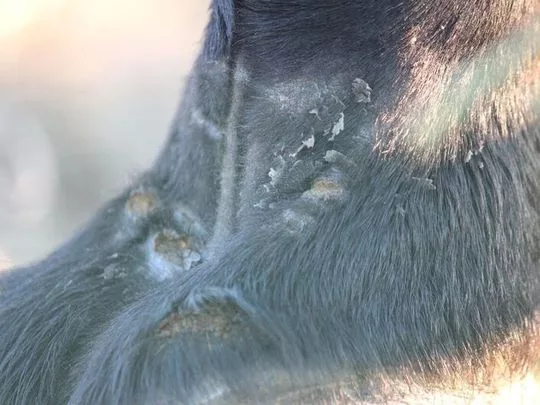Pictured Above: Wounds and scars riddle one of Skywalks Magical Dream’s pasterns. Photo: Horse Plus Humane Society
The moment Tawnee Preisner saw the scarred and wounded Tennessee Walking Horse at a Cookeville, Tenn., auction, she knew she had to act.
If she didn't, the stallion could end up going to slaughter.
Preisner, the founder of Horse Plus Humane Society, bought Skywalks Magical Dream after finding scars and open lesions on his ankles — a telltale sign the horse had been sored.
Although it’s illegal under federal law to auction, sell, show or transport a sored horse, the U.S. Department of Agriculture’s Animal and Plant Health Inspection Service says it has not opened an investigation in Dream’s case, brought to investigators’ attention 50 days ago.
Preisner says the last time she found a sored registered Tennessee Walking horse, it took APHIS a year to begin investigating. APHIS did not respond to requests for comment.
But trying to track down who might be responsible for what experts call animal abuse is complicated by incomplete documents, missing records and secrecy.
Going once, going twice
Dream, with a fading black coat and fretful eyes, changed hands several times since last January when Sammy Cagle says he and his wife, Gayle Cagle, traded in the horse. Sammy wouldn’t disclose the name of the horse’s new owner, saying his lawyer advised him against speaking.
Federal records show the Cagles have owned and attempted to show at least four horses that inspectors found legally sore in the last 10 years. USDA inspectors reported finding a foreign chemical on two of the horses’ pasterns, and two others were in violation of the scar rule. In 2006, they were suspended twice for a total of 5 weeks.
Skywalks Magical Dream, a nearly 4-year-old stallion, next appeared on paper at Sterling Equine Auctions around the time of the Tennessee Walking Horse National Celebration. On Aug. 27, a man visiting from Virginia says he bought Dream at the auction. Sterling was having an event dubbed the “Celebration Open Consignment Sale” in Shelbyville, Ky.
Jim Roberts got rid of him 3 days later.
“I shouldn’t have bought him in the first place,” Roberts says. “I bought him in mind to make him a pleasure horse, but he was a little too much horse for what we do down here.”
Roberts says he didn’t notice Dream’s injuries until his purchase was complete. He says the horse’s previous trainer must have been “working on him pretty good” to leave such injuries.
With buyer’s remorse, Roberts took Dream to where he says he knew performance walking horses are easily sold: Triple W Horse and Mule Sales in Cookeville. Triple W holds an auction every Tuesday.
That’s where Preisner spotted the horse.
The day after she purchased Dream for $625, she had a licensed veterinarian inspect him.
Each of the Dream’s pasterns had ulcerated wounds and hair loss and scars in a Y-shaped pattern, according to the inspection report.
“I didn’t see nothing unusual about the horse,” Triple W Manager Buck Wilson says by telephone. He said he didn’t remember the horse having any scars or lacerations.
Dream is the third sored horse Preisner says she has purchased from Triple W.
“He could have been shown except his legs were fried,” Preisner says. She says when the soring goes so far as to leave strong evidence of abuse, the horses lose their value, ending up at Triple W where kill buyers can purchase them for slaughter.
A murky paper trail
When Dream ended up at Triple W, his registration records still listed the Cagles as owners, since they did not fully fill out the transfer field on the back of the ownership papers.
“(The Tennessee Walking Horse Breeders and Exhibitors Association) requires the seller of the horse to file a transfer of ownership with the registry,” says Keith Dane senior adviser of equine protection for the Humane Society of the United States. “However, there’s a fee involved, and often sellers just sign a transfer slip and give it to the buyer with the horse’s registration papers.”
According to TWHBEA, the buyer is not required to sign the bill of sale or registration papers, but owners are encouraged to execute a transfer properly because it “reduces (the) liability of (the) previous owner with regard to legal actions, such as USDA and other civil and criminal actions.”
The Cagles signed the bill of sale associated with the stallion, jotting down their address, checking the appropriate boxes and filling in the bubbles, but they failed to record the date of sale and buyer information.
TWHBEA Executive Director Rory Williams says he could not verify any information provided about the horse, including name, registration and previous ownership.
“We urge law enforcement to bring to justice the parties responsible for this inhumane act,” Williams said after seeing photos of Dream’s legs. “Our association will be happy to cooperate with authorities in any way possible.”
According to records obtained by The Tennessean, Williams’ organization never processed the transfer of ownership required by the breeder’s association, and the Cagles remained Dream’s registered owners in TWHBEA’s database nine months after Sammy Cagle says the couple sold the horse.
Williams says there is no time limit on when the Cagles can affect a transfer.







